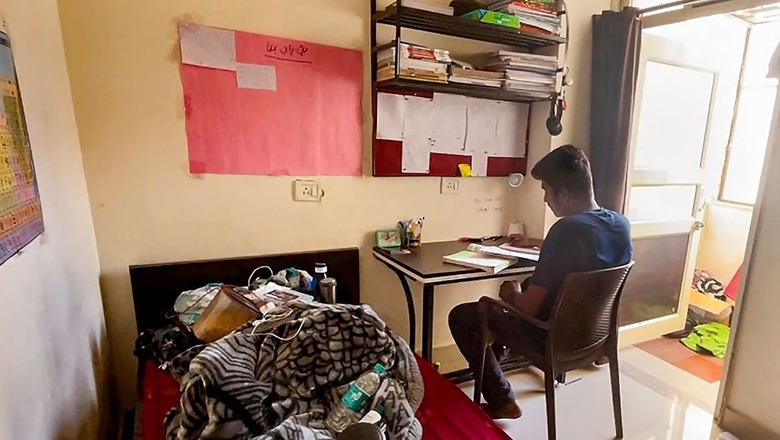
views
Not just the stress of getting good scores and surviving competition, poor quality of food and accommodation at hostels and lodges also bothers students who come to Kota to train for high-stake entrance exams such as Joint Entrance Examination (JEE) and National Eligibility Cum Entrance Test (NEET).
Around two lakh students come to the city every year and find accommodation in the over 4,000 hostels, besides 35,000-40,000 PG accommodations and one-BHK flats. The hostels and even PGs run their own mess for students.
Almost every other student that News18 spoke to in the coaching town said low food quality is an issue and they often skip meals at the mess because of it. Eventually, many students fall sick, some right at the beginning when they are settling-in or anytime through the year. It takes a toll in terms of missed classes and catching up on preparation time.
HIKE IN HOSTEL FEES; MOTHERS MOVE IN WITH STUDENTS
Priya Srivastava, a NEET aspirant, said the quality of food at the mess is unacceptable and this is despite the hike in hostel fee every year. “The fee was Rs 9,000, excluding electricity charges, until last year when I came here. It was hiked to Rs 13,000 this year and still the food is so bad. Many of us raised the issue with the warden multiple times, but she just simply ignores the complaints. Even our parents have requested them to improve the food quality, but nothing has changed. Students often fall sick and have to go back home due to which they miss out on classes and the crucial preparation time," said Srivastava, who hails from UP’s Barielly.
Since last year, mothers of a number of students have moved in with them, both for better food and emotional support. Those staying in the flats are mostly the ones staying with their mothers, said hostel owners. The scenario emerged post-pandemic, as during the two Covid years, when coaching institutes were shut down and students moved out of Kota with classes being held online. The number of student suicides reported in this period was much low.
According to state police records, 17 student suicides were reported from the district in 2015 (the year when the administration started keeping separate records of students dying by suicide), 16 in 2016, 7 in 2017, 20 in 2018, 8 in 2019, 4 in 2020 (Covid year), none in 2021 (Covid year), 15 in 2022 and 23 (as of August 27) in 2023.
“I fell sick last year when I came here after class 10 exams. I got typhoid and had to miss 15-20 days of classes, as I went back home to get well. My parents decided that my mother would move in with me to a flat instead. I left the hostel and since then have not faced any food-related illness," said Akshay Singh from Bihar’s Aarah.
Singh added that away from home in such a high-stress environment, students get homesick too, which takes a toll on their physical and mental health.
SMALL ISSUES; VULNERABLE KIDS GET HOMESICK OFTEN: HOSTEL OWNERS
Hostel owners blamed the change in weather and water for students who come from other states for them falling sick. Some of them agreed that quality is not good at times as mess services are outsourced by most hostels.
“As most of these services are outsourced, the quality is not up to the mark some times. This is the reason that post pandemic, a number of students have started to live with their mothers. Not everyone can do that," said Rajendra Gupta, who runs two hostels in the area.
Many students even said the quality of drinking water available at the hostels is not good, which often makes them sick. “I got diarrhoea in a hostel here. The water filters don’t work properly and the water is not potable," said Parul Goel, a medical aspirant.
Hostel owners say they try to give them home food, but it takes time for students to settle in and that makes some of them homesick. “Every hostel maintains its water facility and the drinking water is potable. There might be some issues at some point of time. The students are very young, around 15-16 year-olds when they come to live here in hostels. They are vulnerable in every way. If they fall sick initially because of a shift from their home conditions and with high pressure of studies, they tend to get homesick," said Bhupendra Sharma, who runs a girls and boys hostel.
DISCLAIMER:If you or someone you know needs help, call any of these helplines: Aasra (Mumbai) 022-27546669, Sneha (Chennai) 044-24640050, Sumaitri (Delhi) 011-23389090, Cooj (Goa) 0832- 2252525, Jeevan (Jamshedpur) 065-76453841, Pratheeksha (Kochi) 048-42448830, Maithri (Kochi) 0484-2540530, Roshni (Hyderabad) 040-66202000, Lifeline 033-64643267 (Kolkata)




















Comments
0 comment